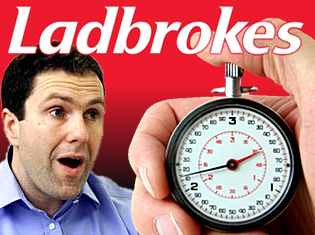 Struggling UK bookmaker Ladbrokes saw its operating profits fall one-third to £138.3m in 2013, while profit before tax fell two-thirds to £67.6m. The profit decline was an equal opportunity destroyer hitting all of Ladbrokes’ verticals but the pain was felt most strongly in Lads’ much maligned online division, which reported profits of just £8.2m, barely a quarter of 2012’s £31.8m. The bad tidings had been widely telegraphed in advance, so the absence of fresh bombshells could explain why Lads’ shares managed to inch up 2.65% on Tuesday to close at 155p.
Struggling UK bookmaker Ladbrokes saw its operating profits fall one-third to £138.3m in 2013, while profit before tax fell two-thirds to £67.6m. The profit decline was an equal opportunity destroyer hitting all of Ladbrokes’ verticals but the pain was felt most strongly in Lads’ much maligned online division, which reported profits of just £8.2m, barely a quarter of 2012’s £31.8m. The bad tidings had been widely telegraphed in advance, so the absence of fresh bombshells could explain why Lads’ shares managed to inch up 2.65% on Tuesday to close at 155p.
Lads’ digital profit decline was all the more stark considering online revenue fell just 1.7% to £175m. (Although stripping aside the £13.7m added by Lads’ acquisition of the Betdaq betting exchange and Australia’s Bookmaker.com.au, online revenue really fell 9.4%.) Online sports betting revenue fell 5.3% to £73.7m, as stakes fell 13.1% due to the “disappointing” response to the second quarter launch of Lads’ new desktop sportsbook. Lads says its new Mobenga-powered mobile sportsbook, which only launched in December, is already paying dividends, with handle and signups up 50% year-on-year since the launch.
Online casino revenue fell 10% to £68.2m, bingo fell 12.5% to £11.9m and poker plunged 31.2% to just £7.5m. Telephone wagering continued its forlorn retreat into the world of 8-tracks and Betamax, with revenue slipping 31.6% to £6.5m and operating losses rising 6.7% to £1.6m. Lads instituted a minimum £25 stake per call towards the end of 2012 which helped push stakes down 30.1% to just £186.4m in 2013. Meanwhile, overall digital operating costs rose 13.3% to £164m.
RETAIL AIN’T THE CASH COW IT USED TO BE
On the retail front, Lads’ UK shops saw revenue rise 8.3% to £800.9m but operating profit fell 25.9% to £133.9m. OTC betting revenue slipped 1.8% to £392.5m, for which the company blames the lack of a major football tournament like Euro 2012, which boosted the previous year’s returns by £5.9m. As of Dec. 31, Lads had 2,297 shops in the UK, a net gain of 101 over 2012.
Revenue from retail machine gaming rose 20.2% to £408.4m, which will likely fan the flames of those who wish to see the controversial fixed-odds betting terminals (FOBT) burned at the stake (along with their operators), but Lads insists its lower-stakes Category B3 machines grew more than the £100-maximum-spin Category B2 machines, which were “broadly flat.” As of Dec. 31, 2013, Lads had 9.091 machines in operation, up from 8.583 at the same point in 2012.
Irish retail operations reported a 1.1% revenue rise to £80.9m but profit fell 28.2% to £10.2m. In Belgium, revenue rose 3.7% to £47.9m and profit was flat at £8.4m. In Spain, the Sportium retail joint venture with Cirsa saw losses increase 25% to £3m.
WILL GLYNN SURVIVE?
CEO Richard Glynn (pictured) called Lads’ 2013 numbers “disappointing” but insisted the results don’t accurately reflect “the real operational progress made.” Glynn implored investors to wait until this summer’s FIFA World Cup is in the books, after which “we’ll hopefully show you some growth coming through” by October.
Lads are in a race to complete the painfully slow migration of its online operations to Playtech’s platform before the World Cup sports betting bonanza. Glynn acknowledged he’d “made a mistake” by assuming “we would be able to do a commercial deal to accelerate getting out of the Microgaming contract and moving to Playtech,” but insisted the company’s online operations would be “match fit” ahead of the June 12 kickoff.
Lads chairman Peter Erskine told the Financial Times that the company’s board “took a hard, thorough look at whether to replace the management” last autumn, when Lads issued the first of several downward revisions to its profit forecasts. While Erskine said the board ultimately decided against hiring corporate headhunters and that Glynn’s current strategy had the board’s full support, Erskine warned that Glynn “hasn’t got any more chances” and said growth had to get back “to a minimum respectability to start winning respectability from shareholders.”
